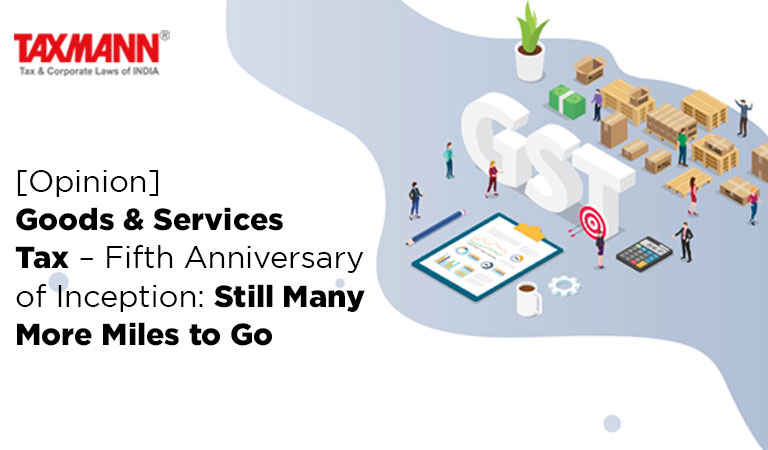[Opinion] Goods & Services Tax – Fifth Anniversary of Inception: Still Many More Miles to Go
- Blog|News|GST & Customs|
- 3 Min Read
- By Taxmann
- |
- Last Updated on 4 November, 2022

Aseem Chawla – [2022] 144 taxmann.com 47 (Article)
India recently observed Fifth Anniversary of the introduction of the Goods and Services Tax (‘GST‘), the marquee indirect tax reform, endeavoring ‘Fiscal Unification’ of India which for the first time economically unified India under the umbrella ideology of ‘One Nation, One Tax‘. Though the Anniversary could have witnessed some fanfare, given that this vital piece of economic reform was presaged on a rare bipartisan consensus. However, it witnessed saw some lukewarm response, in the backdrop of the trust quotient between the Central & State Governments plumbing new lows.
Over the last five years, as many as 869 notifications, 143 circulars, and 38 changes have been administered so far in the GST regime over the last five years. All along, the introduction of GST was premised upon mutual trust & cooperative federalism but given that a certain section of stakeholders and commentators has been somewhat critical about its implementation and the manner of administration of GST has all contributed to the deepening of the distrust amongst the Centre, and States. The Union Parliament, pursuant to an enactment (on the recommendation by the GST Council), inter-alia had also envisioned the provision of compensation to States for the initial five years for the loss of revenue arising from migrating to the GST regime. The State revenue is projected at 14% per annum given that the compensation regime ends on June 30, 2022.
In all these five years, one has seen many ups and downs. Rather it would be apt to suggest that this fiscal law phenomenon is now more popularly referred as ‘Business Reform‘ instead of merely a ‘Tax Reform‘.
All by itself, GST has changed the mindset of taxpayers. Eligible Taxpayer who hesitated in the earlier regime to file returns timely are now giving priority to GST compliance. This experience is completely different from the previous tax regime. The adoption of technology, digital processing, and electronic data compliance is fast becoming the functional spine of the Indirect Tax Ecosystem in India. The Revenue has keenly adopted certain farsighted electronic means to ensure better & timely compliance.
The 47th meeting of the GST Council held on June 28th & 29th 2022 at Chandigarh, was viewed as one of the most important since the implementation of the new indirect tax regime. It not only marked the completion of five years of implementation but also had a wide-ranging agenda. In the backdrop that the overall Revenue collections have somewhat underperformed, adding to overall fiscal stress, while the GST ecosystem has been grappling with structural issues, such as multiplicity of rates and difficulty in enforcing compliance. Although collections have improved over the past several months, the said 47th meeting was expected to address some of the identified structural issues.
Presently, the biggest concern for some states has been the coming of the end of the compensation regime. It is the envisioned States being compensated for the shortfall in GST collection, predicated upon a 14 percent growth in revenue collection, which now ends with the completion of five years.
The Hon’ble Union Finance in the said post Minister -meeting press conference, Several States argued in favour of extending the compensation payment, though for different time periods. No firm decision on this aspect was taken at the said meeting.
The Union Government has already extended the collection of compensation cess, which shall be utilised to repay the debt raised over the last two years to compensate States.
Click Here To Read The Full Article
Disclaimer: The content/information published on the website is only for general information of the user and shall not be construed as legal advice. While the Taxmann has exercised reasonable efforts to ensure the veracity of information/content published, Taxmann shall be under no liability in any manner whatsoever for incorrect information, if any.

Taxmann Publications has a dedicated in-house Research & Editorial Team. This team consists of a team of Chartered Accountants, Company Secretaries, and Lawyers. This team works under the guidance and supervision of editor-in-chief Mr Rakesh Bhargava.
The Research and Editorial Team is responsible for developing reliable and accurate content for the readers. The team follows the six-sigma approach to achieve the benchmark of zero error in its publications and research platforms. The team ensures that the following publication guidelines are thoroughly followed while developing the content:
- The statutory material is obtained only from the authorized and reliable sources
- All the latest developments in the judicial and legislative fields are covered
- Prepare the analytical write-ups on current, controversial, and important issues to help the readers to understand the concept and its implications
- Every content published by Taxmann is complete, accurate and lucid
- All evidence-based statements are supported with proper reference to Section, Circular No., Notification No. or citations
- The golden rules of grammar, style and consistency are thoroughly followed
- Font and size that’s easy to read and remain consistent across all imprint and digital publications are applied



 CA | CS | CMA
CA | CS | CMA
